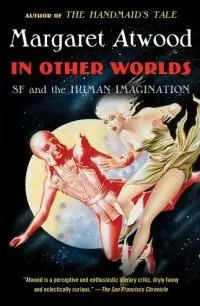In 2009, Ursula K. Le Guin called out Margaret Atwood over comments perceived as disparaging to writers of science fiction. Le Guin proposed that Atwood was attempting to relegate the persecuted genre to the outskirts of the literary ghetto. Turns out, Atwood wasn't being condescending when she said she didn't consider her speculative novels to fall under the nerdiest of banners- the two authors just had differing opinions over what constituted science fiction. The way Atwood tells it- what Le Guin considers sci-fi, she considers speculative; and what Atwood considers sci-fi, Le Guin considers fantasy. It's all very confusing. Luckily, once these two literary ladies got their definitions straight, they put the past behind them, and continue to mutually admire each other's work to this day.
This is all covered in the introduction to Atwood's latest, In Other Worlds, an exploration of her longstanding relationship with what may or may not be science fiction. I was hoping to interview Ms. Atwood about the book, but unfortunately it was not to be. I was informed she had only 48 hours to squeeze in as much publicity as possible, including multiple lecture appearances and select national media interviews (ie: high profile shit.) You see, even for an author of Atwood's stature, not nearly as much promotional dollar is thrown at essay work. Thus, this piece was downgraded to a lowly review. Looks like non-fiction is the real literary ghetto, not sci-fi.
 Which is a shame, because I had some really great questions lined up. I know, I know- every parent thinks their kid is the best looking and the brightest- but I really did. Now I'll never get to know whether, due to her views that utopia and dystopia "each contain a latent version of the other," she feels that anyone trying to make the world a better place is simultaneously contributing to its downfall. Or why, for someone who loves science fiction so much, it took her so long to write it (almost 15 years into her career). Or why it took another 18 to return to the genre (definitions notwithstanding). I won't get to ask her about her apologetic fondness for works that hardline feminists might consider sexist, like H. Rider Haggard's She. Or about the blasphemous metaphor hidden within The Island of Dr. Moreau. Or about the rumored 2nd companion piece to Oryx and Crake.
Which is a shame, because I had some really great questions lined up. I know, I know- every parent thinks their kid is the best looking and the brightest- but I really did. Now I'll never get to know whether, due to her views that utopia and dystopia "each contain a latent version of the other," she feels that anyone trying to make the world a better place is simultaneously contributing to its downfall. Or why, for someone who loves science fiction so much, it took her so long to write it (almost 15 years into her career). Or why it took another 18 to return to the genre (definitions notwithstanding). I won't get to ask her about her apologetic fondness for works that hardline feminists might consider sexist, like H. Rider Haggard's She. Or about the blasphemous metaphor hidden within The Island of Dr. Moreau. Or about the rumored 2nd companion piece to Oryx and Crake.
Sorry, but I had to do something with all my research. At any rate, it gives you a good idea of the ground the book covers. You won't get specific answers to all my well thought out chil- I mean, questions, but you will get a thorough overview of Atwood's love affair with sci-fi.
The meat and potatoes of the book are Atwood's three never before published Ellmann Lectures, which took place in 2010. They chronicle her childhood dalliance with genre fiction, following her through college and all the way to the creation of her very own dystopias. The second half contains a cherry-picked assortment of her review and essay work, which spans the entirety of her career; covering everything from Huxley, Orwell, Wells, and Swift; to more modern authors like Kazuo Ishiguro and her old fremesis, Le Guin.
The second half is a perfect compliment to the first, a parallel timeline of old love letters to go along with the reminiscence of the Ellmann essays. We get to share in the excitement of a young girl falling in love, as well as benefit from the wisdom of a grown woman looking back. The whole is greater than the sum of its parts, giving a thorough overview of a unique creative life.
Or at least one part of it. Atwood has written far fewer speculative novels than non, yet it's what she is most known for. It seems to me there must be a whole wealth of untapped material about the other literary life she's been leading. But after reading In Other Worlds, I can't possibly see what could have influenced her more than a certain misunderstood genre. It is a discussion for a future interview, which I have been assured will go down when Atwood publishes her next book of sweet, marketable fiction. I've been told it is expected to be delivered within the year, and yes, that it will be the highly anticipated third volume in the speculative trilogy that started with Oryx and Crake.
Get In Other Worlds at Bookshop or Amazon

About the author
Joshua Chaplinsky is the Managing Editor of LitReactor. He is the author of The Paradox Twins (CLASH Books), the story collection Whispers in the Ear of A Dreaming Ape, and the parody Kanye West—Reanimator. His short fiction has been published by Vice, Vol. 1 Brooklyn, Thuglit, Severed Press, Perpetual Motion Machine Publishing, Broken River Books, and more. Follow him on Twitter and Instagram at @jaceycockrobin. More info at joshuachaplinsky.com and unravelingtheparadox.com.







